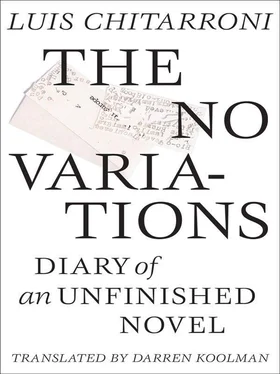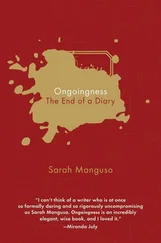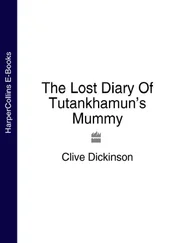Considering the literary atmosphere of the time — the days of Tel Quel , Barth’s “Literature of Exhaustion,” and the Ouvroir de Littérature Potentielle … the era stretching from The Waste Land to Ada (which latter would have been published right around the same time the contest took place?); not to mention that of Finnegans Wake —the second criterion was a patriotic one: French literature might have felt a little depleted, not quite the [roll call] starry firmament it had presented in previous centuries. Why weren’t these great precursors more appropriated [drawn upon]?
The funny thing is an Argentine won. Nicasio Urlihrt, a temporary resident of Paris, wrote the winning story in twenty one days (eight less than Stendhal) with no other library at his disposal than the one in his memory. He was lucky enough to befriend an excellent Antillean translator, Iphigenie Andromaque [Girri, Je pense a vous ] Prévost, who could translate as fast as the story was written.
The author’s notational convention is given at the beginning
Even stranger, the first writer mentioned is also Argentinian: Osvaldo “Lalo” Sabatani, author of “Sircular Cymmetry,” a type of dialogue borrowing from the Ulyssean theme. Sabatani had had more difficulties. Firstly, his translator happened to be Urlihrt’s wife [Raquel Elena Salafia?], Elena Siesta. She was a fine translator but a slow and painstaking redactor. To achieve his unusual feat, Urlihrt used a detailed notebook. As Oliverio Lester discovered later, he used such a notebook in order to include, with a minimum number of variations, as many allusions as he could to the books he’d read in the previous three years. It was surely the variety of these references, and the way they were incorporated, that won favor with the judges. But what especially impressed them, was the way he adapted these references to his own language in such a way that made them appear fresh, original — it was as if they were being read for the first time — and the way his cryptic style made the writing seem almost inscrutable, the references almost undetectable, but with occasional lapses of more direct and coherent prose which, although less lively, functioned as a series of interludes.
The conception of Urlihrt’s story had little to do with Walsh’s story, “Footnote”
Careless verses
[ Pushkiniana I, ode to Istómina’s foot ]
A foot lightly touches the floor
The other, delicately crooks—
As the pause before exhale of air
From Aeolian lungs—; they prepare
To ripple-trail across a brook .
Istómina danced [,] to purge her body
Of desire, her soul of apathy .
Too showy
NO
Poetry
#1 Careless verses
#2 Mid Sixties
#3 Poshlost
#4 Social life
St. Mawr (by Javier Manjares)
It wasn’t long after we finished our meal that Henrietta [Bonham-Carter / / Ormsby-Gore, Gome-Hornsby] once again showed her disapproval in that familiarly ambiguous fashion: free of disdain but not repudiation; of fastidiousness but not disinterest; one of those English ways of objecting that offend more in the performance than the remembrance, but which nevertheless leave an impression. For the objection is always timely but never pointed, well-expressed but barely relevant, and if it is offensive, it offends no one in particular. Henrietta only rarely showed her disapproval, but when she did, it was with practiced accomplishment (the key to which lay in her economy of expression). I had mentioned something about the portrait of F. R. Leavis when her back was turned, and my expression must have reflected a somewhat faded admiration for the author of The Great Tradition , which I had read passionately in my youth, a time when I was becoming acquainted with D. H. Lawrence and when his poems (the “local” version, I mean, translated and published in a volume titled Phoenix ) were required reading. But Henrietta disapproved of my admiration, or perhaps I should say, she implied her disapproval of what was left of my admiration.
In that not too distant past, Henrietta [it’s Bonham-Carter] held the position of [consul] “sympathetic interpreter” (although she couldn’t speak Spanish) for the British Council’s department of cultural exchange. And I had converted one of her nieces into an avid cineaste, for we often went to the cinema together, although I rarely looked at the screen, the object of my gaze being not a projection of light but a girl of flesh and blood, a girl with whom I fell in love not far from where that cinema was located — in Cambridge — while on a picnic beside a stream. But despite the romantic setting, there were no declarations of love, only intimations. Neither were there declarations of independence (I say this because, the previous evening, we had discussed the famous picnic that, according to Auden, inaugurated literature’s independence: the July 4 picnic of 1862 which the Reverend Dodgson and three little girls had in a narrow boat.)
But the evening that concerns us — that of Henrietta’s disapproval — we (Henrietta, Melchior, Nigel, and I) had conversed for quite a long time, and not on academic topics, but about French chanteurs [and American songwriters ], particularly those Henrietta liked best — Brassens and Brel — but also Trenet, Reggiani, and Gainsbourg. [[and Leonard Cohen, [Loudon Wainwright, Harry Chapin, and Gordon Lightfoot]. We stuck with the French ones]] And Tony Gaos, my Argentine friend, also mentioned Polnareff and Dutronc, boasting of his meager knowledge, for which he was forgiven because he was a greenhorn, while I was dueling surreptitiously with the overcooked lamb, trying to forget the taste of the undercooked potatoes, which the wine had barely masked. It was a French cabernet, awful. I expected a lecho de piedra.
I am Spanish. I work, without much passion or conviction, in the publishing industry. I’d like to say our publications are all commercial failures, the kind of literature that must be wary of success, for I certainly have an intuition for such writing — a feel, a nose, if you will — and I’m not bad at the business side of things, and if it weren’t for that pretentious clan of pseudonymous scribblers, here (or I should say “there,” for I’m writing pretty far from where it all happened) we call them “hacks,” and if it weren’t for those tightwad publishers, whose trust [in a noble lineage] helps me to recognize my colleagues under the veil, I can honestly say, and without boasting, that things would be going great.
F. R. Leavis looked like the kind of man he was, or must have been: like a guardian of integrity, a professional who knew how to do his job well, and a man who had a special dedication to his art. Moreover, the old photos I saw of him were a record, despite their weathering, of a man who ensured even his posture should attest to the probity of his criticism, a man whose corrugated features were an index of his candor, of his contempt of ostentation (although there are various anecdotes that give lie to some of these descriptors). Work by Peter Greenham, the varied palette, the tense, nervous brushstrokes: a less rustic-looking Augustus John. The Metropolitan, Urbana. [ Farouche and Uncouth cancel each other out — the names of those two jokers who made our stay in Stratford-upon-Thames so uncomfortable]. It’s [truly] convenient to be born late and be able to calumniate our precursors and ancestors who rest silent in the grave.
It’s terribly convenient, easy even, or it was back then.
And I recalled an observation of Hugh Kingsmill’s, a man who was always ready to calumniate. He even compiled an anthology of abuses and invectives in which he assured the reader that “invective” is when we do it to them, while “abuse” is when they do it to us. Despite having child-like fingers and a face like a porcelain doll, Ada Antonia (Nonham, according to an Argentine friend) tore apart her bun with as much grace as ferocity, before doling out the same treatment to one of the compositions — seasoned, thanks to her reading, with useless inkhorn terms, vague nonliterary importations, portmanteaus, archaicisms, provincialisms — which I condemned as violating the criterion of those of us who resolved — who were chosen — to dwell on the isle of understatement . We happy few , of whom there were still a few who were suspicious of immediate happiness. The world is still just an expensive toy we share among us. A large toy, but free, and amusingly adjectival.
Читать дальше












